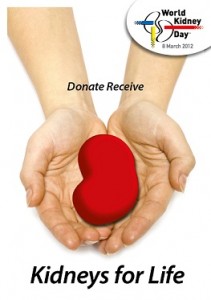By PATRICK KING PASCUAL
 CAROL (not her real name), a long-time dialysis patient at the Makati Medical Center (MMC), depends on a wheelchair for mobility.
CAROL (not her real name), a long-time dialysis patient at the Makati Medical Center (MMC), depends on a wheelchair for mobility.
Being a diabetic since childhood, she developed peripheral neuropathy (or the damage of nerves of the peripheral nervous system). This resulted to her not being able to walk.
She needed to find an immediate kidney donor for her condition to be better. All her family members were diabetic, so they were not fit to donate their kidneys to her.
Worse, Carol’s blood type is A, which made it more difficult to find a suitable donor.
Hope came when she was chosen and enlisted as a candidate for kidney transplant by the Human Organ Preservation Effort. In less than a year, she got a new kidney.
Human Organ Preservation Effort is a non-profit organization in the Philippines under the National Kidney & Transplant Institute, which handles transplants of patients who have different end-stage organ diseases. Donors are mainly patients who have been declared brain dead by the hospital with the consent of a family member, and with normal functioning organs.
Carol was one of the four guest patients who spoke and shared their experiences at the MMC’s celebration of World Kidney Day (WKD) on March 8. It was a gathering of MMC’s dialysis patients, post-kidney transplant patients, their relatives and their treatment partners.
Together with the whole renal department of MMC, they commemorated the event by remembering the struggle and triumph they all experienced through the whole process of dialysis sessions or kidney transplants.
The 2012 Campaign focused on the positive outcome of kidney transplantation and the life-saving aspect of organ donation. The slogan for this year’s campaign is “Donate — Kidneys for Life — Receive.”
One of its objectives, the WKD website said, is to encourage “transplantation as a best-outcome option for kidney failure, and the act of organ donation as a life-saving initiative”.
“As part of our celebration of the World Kidney Day, we want to raise awareness about our ‘amazing kidney’ to the next level,” Dr. Filoteo Ferrer, assistant training officer of MMC’s Nephrology Department, said.
As mandated by The Philippine Society of Nephrology, the MMC celebrated the event at the Nephrology Center or the Renal Care Department. It was organized by the hospital’s nephrologists.
“We also need to highlight that diabetes and high blood pressure patients are key risk factors for chronic kidney disease,” Dr. Ferrer added.
Chronic kidney disease is the progressive loss in renal function over a long period of months or years. All patients who have damaged kidneys are considered as having chronic kidney disease. This can be identified through blood test for creatinine.
Years of suffering from hypertension damaged Bobby’s (not his real name) kidneys. Bobby is now undergoing dialysis at MMC.
Like most dialysis patients, his main problem is maintaining the high cost of the thrice-a-week treatment.
“It occurred to me that the P6,000 I spend every session is starting to become a burden to my family,” he said. “It was a matter of deciding whether to continue the treatment or just stop it.”
“But after continuous sessions of hemo-dialysis, I’m already feeling better and stronger compared to the first time I started,” he recalled.
In the Philippines, the leading causes of kidney failure are diabetes, inflammation of the kidneys, and hypertension (or high blood pressure).
The signs of kidney diseases in patients with diabetes are: high blood pressure; ankle and leg swelling and cramps; presence of protein in the urine; high level of blood urea nitrogen (BUN) and creatine in the blood; going to the bathroom more often at night; morning sickness, nausea and vomiting; weakness, paleness and anemia.
To avoid kidney diseases as stated in the World Kidney Day 2012 Pledges, it is advisable to reduce salt intake, consume a healthy amount of fluid, eat healthy, maintain a healthy weight, and exercise 30 minutes per day.
“We would like to raise awareness of everyone that having kidney problems is not solely limited to those who have diabetes (in their family), or to those who have heart problems; everyone is a candidate,” Dr. Ferrer said in his closing statement. “Awareness of the ailment and early prevention is always the key to reduce the frequency and impact of kidney disease and its associated health problems.”